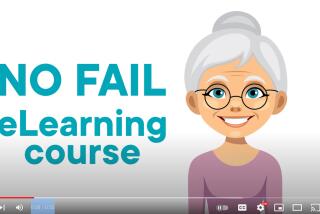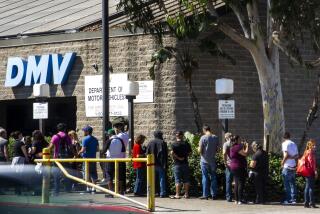Proper procedures can avoid a mess in private used-car sale
- Share via
Question: I sold a used car about six months ago and thought it was a done deal. Then one day, the buyer appeared at my door, asking me to sign a Department of Motor Vehicles form for a duplicate title. It seems he never transferred the title and then lost it. Now, the license plate tags are expired. If I sign the form, am I admitting to some kind of liability for license fees or parking tickets?
-- S.W.
Answer: Your problems are one reason many people prefer to trade in their vehicles to a dealer.
In a private transaction, people worry about liability, legal disputes and other problems unforeseen at the time of the sale. However, selling your own car can be worth hundreds, or even thousands, of additional dollars in your pocket.
The short answer to your question is that it probably is safe for you to sign the form. If you refuse, your buyer would be stuck in a DMV Catch-22. Technically, that’s not your problem, but as the seller of a vehicle, it’s not the right thing to do.
Selling a car is fairly complicated. You need the vehicle title, registration form, smog certificate and bill of sale. Federal law requires you to certify the correct odometer reading. And vehicle taxes must be up-to-date with current license tags.
It’s hoped that these matters were in order at the time of the sale and you followed the correct procedures to notify the DMV.
When you sell a vehicle, you must send the DMV a “Notice of Release of Liability.” The form usually is attached to the vehicle title (better known as the pink slip) or can be obtained at DMV offices or via the Internet at www.dmv.ca.gov.
If you don’t file this form, then you are depending on the buyer to promptly transfer the title at the DMV office. But you have no way of knowing whether the buyer will do so. Once they drive away, they have your car with your license plates and your title in their pocket.
Once the DMV obtains the release, you should be absolved of any liability from the date of sale. You would not be responsible for tickets, taxes, accidents or crimes involving the vehicle from then on, DMV spokesman Ron Owens said.
Under state law, the buyer must go to the DMV within 10 days of the purchase and transfer the title or face a penalty that increases with time. Most buyers follow the law, because obtaining a new title costs only $15.
The license tags are good until they expire, so the sale does not affect them. But in this case, because your buyer lost the title and the tags are expired, he’s got a mess on his hands. He cannot obtain a new title without your signature on an application for a duplicate. And with expired tags, he will be an easy target for the police.
Paperless titles, which the DMV is working on, would help eliminate these kinds of problems. Although you may feel burdened by this mess, the buyer assumes the greatest risk when it comes to titles. Thousands of car buyers in California are defrauded every year when they buy stolen vehicles with fake titles.
One precaution for the buyer and seller in a used-car transaction is to examine each other’s driver’s license. That gives some assurance that the parties are who they claim.
You should also insist on buying a vehicle at the seller’s residence instead of at a common meeting place. That’s a typical method of operation in a fraudulent deal.
You might tell the buyer that you will sign the application for a duplicate title just once and that you don’t want to see him again. This is a good lesson in why it pays to be honest when you sell a car. You don’t want to get into disputes with people after the car has left your sight.
*
Ralph Vartabedian cannot answer mail personally but responds in this column to automotive questions of general interest. Please do not telephone. Write to Your Wheels, Business Section, Los Angeles Times, 202 W. 1st St., Los Angeles, CA 90012. E-mail: ralph.vartabedian@latimes.com.



